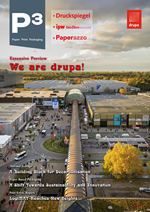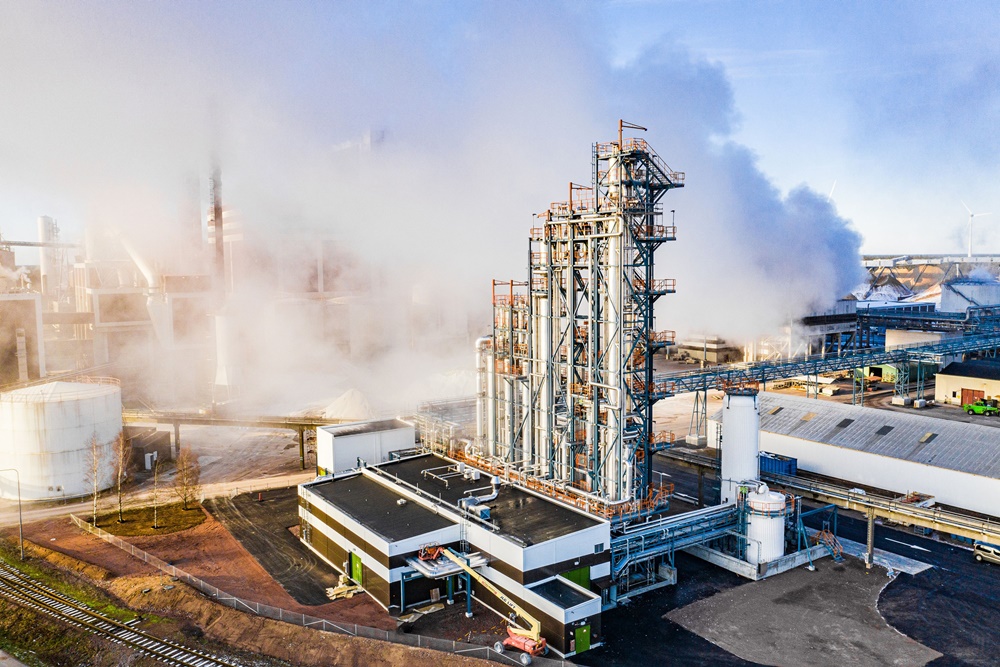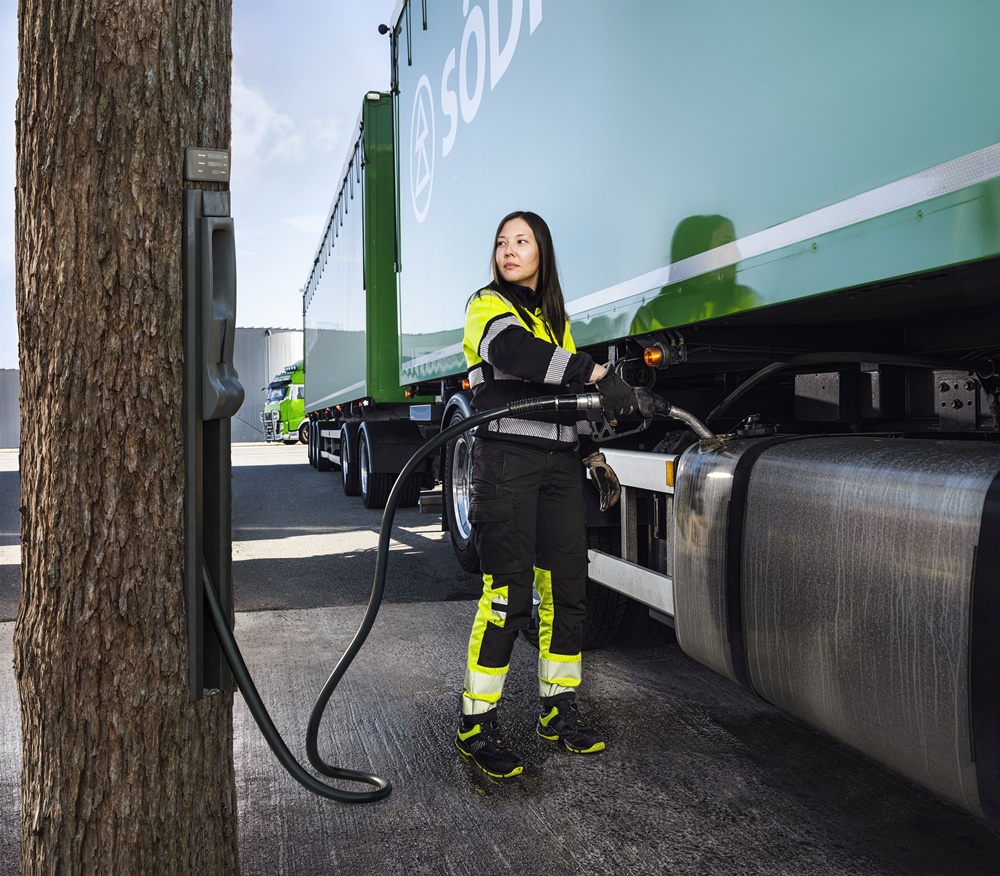P3 7-8/2020 en
Södra
Refuelling the Future
Products & Projects

Södra is committed to being free of fossil fuels across the entire group by 2030, including all transport. As well as driving fossil fuels out of its value chain, the company has started up a world first – a biomethanol plant at its Mönsterås pulp mill. The result? The project is ambitious but achievable.
A world first: Södra’s Mönsterås pulp mill inaugurated its commercial biomethanol plant last October. The plant has a capacity of 5,250 tpy of biomethanol, which is being marketed as Liquid Forest.
The Swedish forest products group Södra is best known for its pulp and timber production. These remain the core focus of the Group but in recent years the company has also stepped up its mission to contribute further to a more circular economy, setting several environmental targets which have been given the same priority as the company’s financial targets.
Among them was the bold declaration in 2016 that Södra would become free of fossil fuels across all operations, including transport, by 2030. The company had already committed to being fossil-free for production by 2020 and now hits that production target on a day-to-day basis, leaving transport as Södra’s main source of greenhouse emissions. In 2019 Södra was 99.5 percent fossil-free for production and 94 percent fossil-free overall.
When the project started, Södra was using 85,000 m3 of fossil fuels in its transport system. Internal reliance on fossil fuels has been eliminated. Södra only offers renewable choices (HVO and RME) for trucks at its on-site filling stations, up from 50 percent in 2016. It is also involved in pioneering work to build the world’s first large-scale biodiesel production facility based on solid biomass through the Silva Green Fuel joint venture. This would be in addition to the current use of tall-oil, the pulp production by-product, as a source of bio-diesel, which already produces a healthy surplus over the company’s own needs. And there are numerous other initiatives such as the use of electric forklift trucks across production sites.
This leaves external transportation and here cooperation with the company’s partners across the logistics chain is crucial if the 2030 target is to be met. The company has been working with customers, suppliers and authorities in an effort to move more of its goods by rail but the key is that all forms of transportation are powered by renewable energy.
With internal transport already 100 percent fossil-free, the emphasis is now on two areas: technical innovation and external partners - creating a pull effect by producing fossil-free alternatives within the Group and pushing others in the chain to reduce their use of fossil-based fuels. “We believe that if we are to succeed in transitioning our transportation system, we must stimulate demand for sustainable transportation,” says Project Manager Henrik Brodin. “Our role is split between the supply side and demand side, as producers and consumers of renewable energy. We take our responsibility for both very seriously.”
The pull: A “world first ”
Technical innovation has taken the form of a world first at the company’s Mönsterås pulp mill with the inauguration in October of a SEK-100 million (EUR 10.5 million) commercial biomethanol plant. Södra’s biomethanol is made from the same wood raw materials that the pulp mills use, sustainably sourced from the company’s own members’ forests in Southern Sweden. The plant has a capacity of 5,250 tpy of biomethanol, which is being marketed as Liquid Forest.
Production begins with the sulphate pulp process at the mill – methanol is created during the cooking process when woodchips and chemicals react to separate the cellulose and hemicellulose. After cooking, the chemicals, lignin and other residues are washed out of the pulp to form black liquor, whose water content is then reduced by evaporation. What remains is a condensate of methanol, turpentine and sulphur compounds.
The condensate is cleaned to be reused in the mill, creating raw methanol which is a mixture of combustible residues, normally burned to produce heat and energy. But thanks to a patented extraction process, Södra can now produce a commercial grade methanol product instead – about 10 kg of biomethanol for every tonne of pulp. The new product is certified according to ISCC, indicating that its manufacturing is environmentally, socially and economically sustainable. Initially, pilot deliveries were sent to Danish biofuels producer Emmelev A/S for use instead of fossil-derived methanol in its biodiesel production. Emmelev A/S is a Danish family-owned agricultural company that has developed large-scale biodiesel production from local canola (rapeseed) but currently uses fossil methanol as a raw material in production.
“Södra’s investment in biomethanol is entirely in line with the European Green Deal (see below), which has the aim of dramatically reducing our carbon footprint and reducing emissions. By manufacturing the world’s first fossil-free biomethanol, we are demonstrating how engineering prowess and innovation can contribute to the transition of society. We are pleased that the importance of this kind of investment is understood by politicians,” says Lena Ek, Chairman of Södra.
The Push: Getting others in on the act
Methanol is already a major commodity but its biggest impact in terms of Södra’s ambitions would be to see biomethanol used as a fuel in shipping. Even fossil-derived methanol offers several notable environmental advantages over heavy fuel oil (HFO). It degrades naturally in water and emits neither sulphur, nitrates, nor particulates. Biomethanol is molecularly identical to the fossil-derived version, so substitution is straightforward.
When the project was first launched four years ago, Brodin identified shipping as the biggest hurdle for Södra to achieve its goal of becoming fossil-free across all transportation. In recent years, Södra has increased its sales of forest products to Asia, a market that can only be commercially viable when served by sea freight from Sweden. But sea freight remains heavily tied to fossil-based fuels, requiring substantial investment and time to retrofit or replace vessels. The fact that shipping companies have not been subject to a carbon tax has meant there has not been much motivation to switch from fossil-based HFO either.
However, says Brodin, things are changing. The Fastwater project is one of several initiatives targeted at achieving the Paris and IMO targets of a 50 percent reduction in carbon dioxide from maritime transport by 2050. Fastwater aims to accelerate shipping’s move towards methanol, and the more ships that can use methanol, the more that can use the fossil-free version, biomethanol.
Fastwater and the EU’s Green Deal, including a proposed revision of the EU emissions reduction target from 40% to 55% by 2030, are piling on the pressure and Brodin believes shipping companies are taking note. Maersk, for example, is publicising its Eco Delivery innovation: “A carbon neutral way of shipping is not a distant reality anymore,” claims the company. Brodin is the first to admit that a shipping giant such as Maersk has much more leverage than Södra to reduce the use of fossil fuels in sea freight, but the biomethanol plant at Mönsterås is a significant strategic and technical contribution.
The EU’s Green Deal is a major motivator not only for shipping but throughout the supply chain. Mette Quinn, Head of Unit for the EU ETS Implementation and IT DG Climate Action, told PRIMA 2000 delegates online earlier this year that the challenging backdrop of the economic fall-out caused by Covid-19 offers an opportunity to accelerate investment into a clean transition. There has been a complete decoupling in Europe of economic activity and greenhouse gas (GHG) emissions: the EU’s net GHG emissions and removals in 2019 reduced emissions by an estimated 25% compared to 1990, while GDP grew by 62%.
The EU is calling for climate neutrality by 2050, which means tougher action is needed, including a European Climate Law which the European Commission will propose, aimed at turning political commitment into a legal obligation and what it hopes will be a trigger for investment. “Reaching this target will require action by all sectors of our economy,” says Quinn. “We have focussed a lot on climate and energy in the past. But now we need to see a focus on decarbonising the whole economy.”
To 2030 and beyond
When Södra launched the 2030 project, it was driven by increasing awareness of sustainability issues among Södra’s 50,000-plus forest owner members as well as customers and wider society. The use of fewer and more sustainable resources made not just ethical sense but economic, too. It also sat well with the company’s overall sustainability ethos. As Brodin pointed out: “It’s not just a question of reducing our dependence on fossil fuels. We want to aim high, to have a more positive impact on the planet by reducing our energy use, not just switching from one fuel to another. Efficient management of resources is key for the future.”
That was then but the view still holds. Södra knew the ambition to eliminate fossil fuels from the entire Group was a bold one – it had never been achieved across a whole company of this size. But the combination of what Brodin calls ‘responsible risk taking’, innovation and partnerships with suppliers is paying off and, he says, “2030 is more realistic every day”.
“Society has moved further than I anticipated,” Brodin continues. “Take bio-based aviation fuel for example. Not so long ago it was no more than an idea. Now it is a technology which just needs scaling up. This is not to dismiss the challenges ahead, but the positive ‘can-do’ attitude to technology gives a huge boost to progress. We see increased interest among customers and other supply chains. Fossil-free, climate neutral - it's changing all the time but gathering pace in the right direction and we intend to be part of the more sustainable solution.”
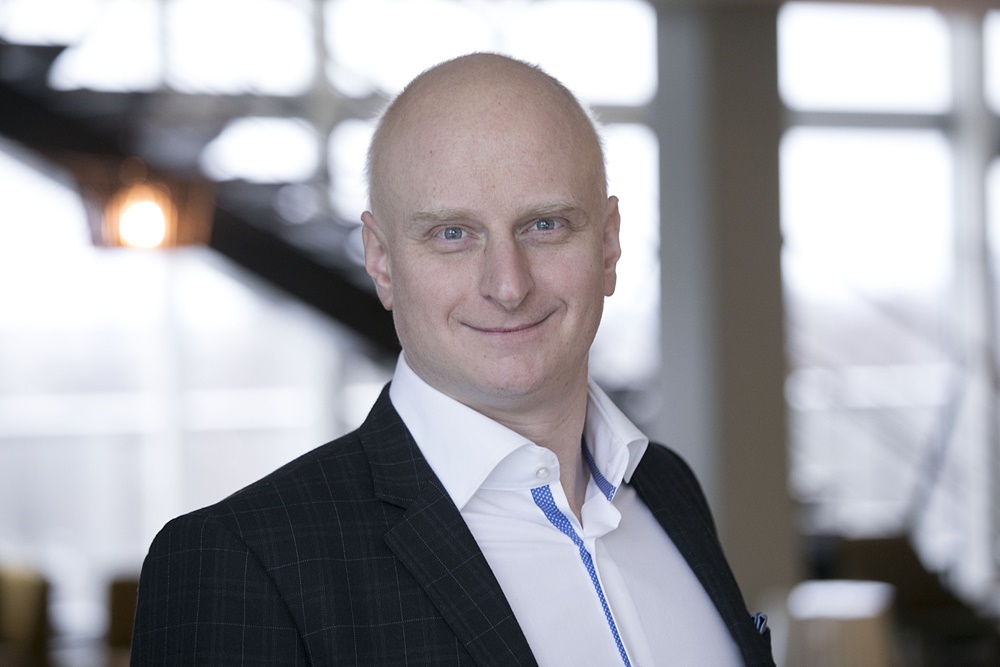
Project Manager Henrik Brodin. “Our role is split between the supply side and demand side, as producers and consumers of renewable energy. We take our responsibility for both very seriously.”
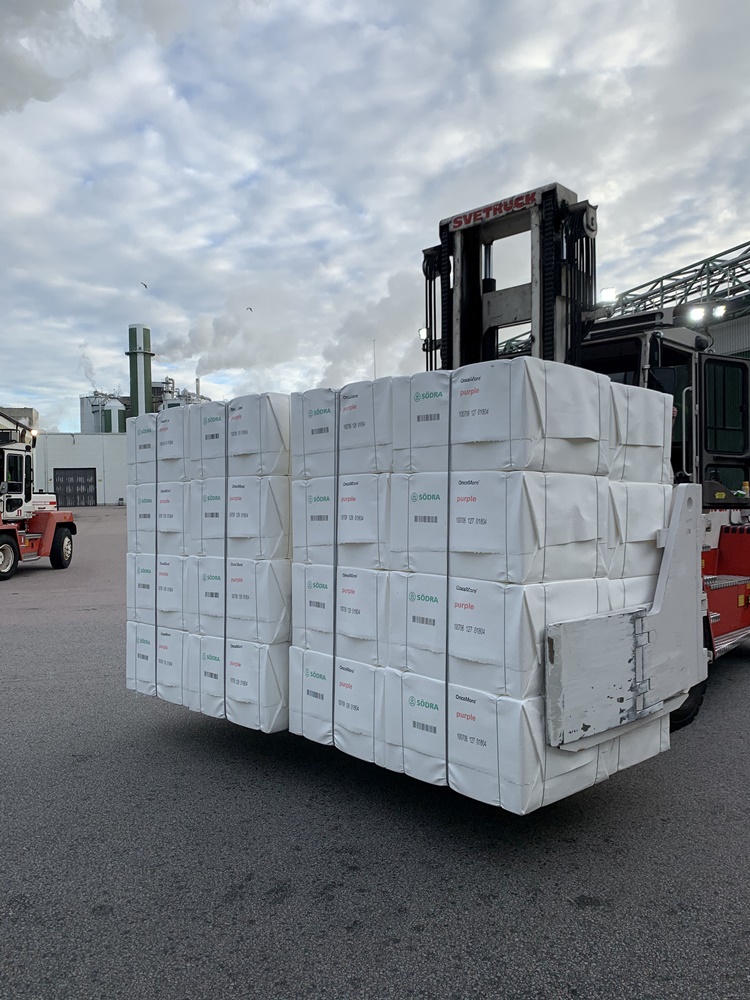
Electric forklift trucks are just one initiative in Södra’s bid to become entirely free of fossil fuels.
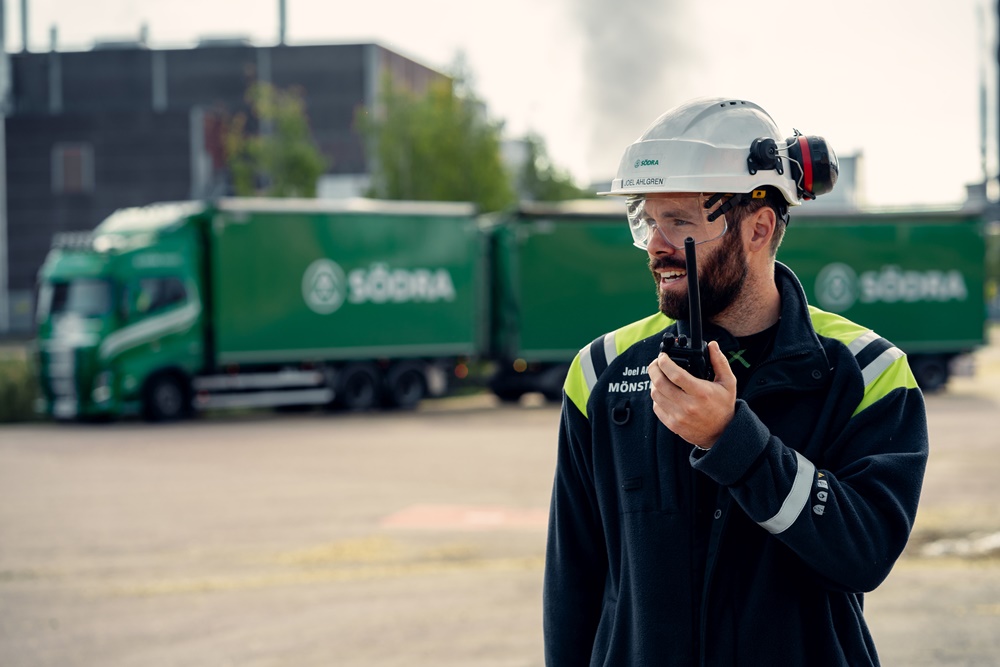
When the project started, Södra was using 85,000 m3 of fossil fuels in its transport system. Internal reliance on fossil fuels has now been eliminated.
Editor: sbr
Images: Södra

